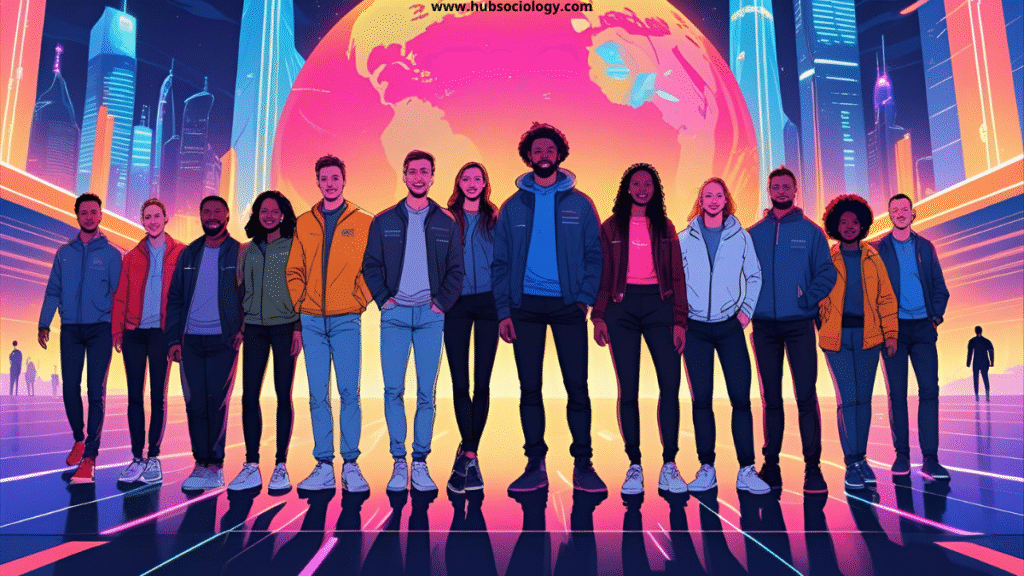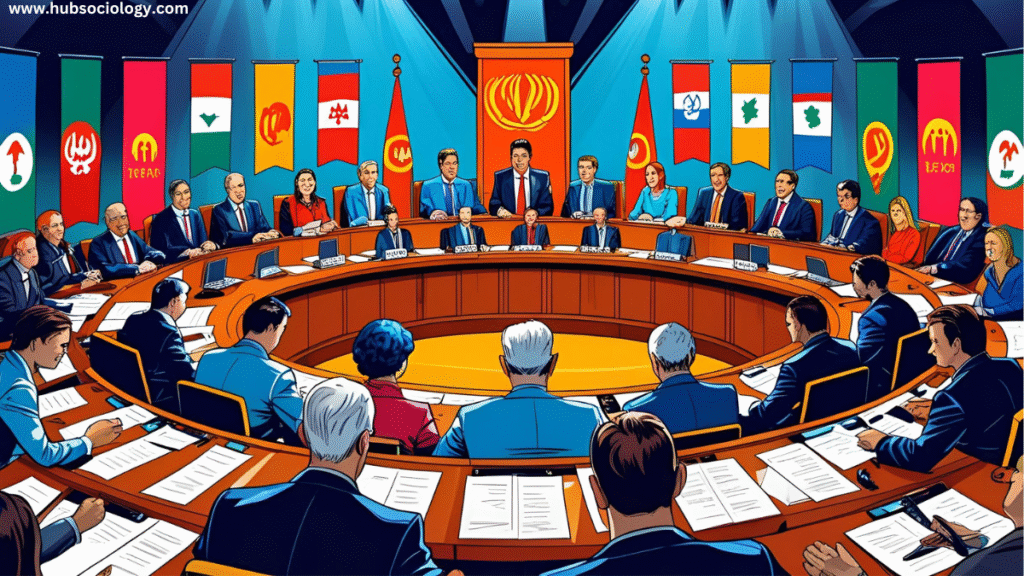Introduction
Globalization has emerged as one of the most influential processes shaping contemporary society. It is not simply a buzzword but a multidimensional phenomenon that connects people, cultures, economies, and political systems beyond traditional territorial boundaries. While economists often define globalization in terms of trade and markets, and political scientists emphasize international institutions and governance, sociologists provide a broader and more critical understanding. From a sociological perspective, globalization is a dynamic process that reconfigures social relations, cultural identities, and institutional structures on a global scale. It is about the intensification of worldwide social interactions that compress time and space, transforming the way individuals and societies perceive themselves and their place in the world.
This article aims to define globalization in sociological terms, explore its key dimensions, and highlight how it affects societies, identities, and inequalities.

Defining Globalization in Sociology
In sociology, globalization is commonly defined as the widening, deepening, and speeding up of worldwide interconnectedness in all aspects of social life. Anthony Giddens, a leading sociologist, describes globalization as the intensification of worldwide social relations that link distant localities in such a way that local happenings are shaped by events occurring many miles away, and vice versa.
Thus, globalization is not just about the circulation of goods, money, or technologies, but also about the circulation of ideas, cultural symbols, lifestyles, values, and social practices. For instance, the use of social media platforms connects people across continents instantly, influencing culture, politics, and social behavior.
From a sociological viewpoint, globalization has three core features:
- Interconnectedness: Local and global societies are tied together in networks of communication, trade, migration, and culture.
- Compression of Time and Space: Advances in transportation and communication technologies collapse geographical distances, making global interaction instantaneous.
- Transformation of Social Institutions: Education, family, religion, economy, and politics adapt under global influences, leading to hybrid structures and new forms of identity.
Dimensions of Globalization in Sociology
- Cultural Globalization
Cultural globalization refers to the transmission of ideas, values, and cultural expressions across national borders. This leads to greater cultural mixing, the emergence of global popular culture, and the spread of common symbols such as brands, films, and sports. Sociologists debate whether cultural globalization results in homogenization (a global culture dominated by Western or capitalist values) or hybridization (a blending of local and global influences, producing unique cultural forms). For example, the popularity of Bollywood films outside India or the adaptation of Western fast food in Asian countries with local flavors illustrates hybridization. - Economic Globalization
While primarily studied by economists, sociologists examine economic globalization for its social consequences. The spread of multinational corporations, outsourcing, global supply chains, and free trade agreements reconfigure labor markets and social inequalities. Economic globalization increases opportunities for wealth but also deepens the divide between the Global North and Global South, as well as between urban elites and rural communities. - Political Globalization
Political globalization involves the growing importance of international organizations such as the United Nations, World Trade Organization, and International Monetary Fund, as well as regional blocs like the European Union. Sociologically, it reflects the erosion of absolute national sovereignty and the rise of global governance. Yet, it also generates tensions, as local communities resist external political pressures that conflict with cultural values or national interests. - Technological Globalization
Technology is the backbone of globalization. Internet connectivity, smartphones, artificial intelligence, and satellite communication enable instantaneous interaction across the globe. From a sociological standpoint, technological globalization reshapes patterns of communication, relationships, and even social movements. Digital activism, such as the #MeToo or climate justice movements, spreads rapidly worldwide, demonstrating the role of technology in building transnational solidarity. - Social Globalization
Social globalization focuses on the increasing mobility of people, such as migration, tourism, and diaspora networks. Migration reshapes demographics and introduces multiculturalism into societies, leading to both enrichment and conflict. For example, South Asian communities in Europe or the Middle East maintain transnational ties, remitting money home while influencing both host and origin societies culturally and socially.
Theoretical Perspectives on Globalization
Sociologists interpret globalization through different theoretical lenses:
- Functionalist Perspective
Functionalists view globalization as a natural progression of societal evolution. It enhances interdependence and cooperation, leading to stability and development. For instance, global institutions can help prevent wars or coordinate responses to pandemics. - Conflict Perspective
Conflict theorists highlight the inequalities and exploitation inherent in globalization. They argue that globalization reinforces capitalist dominance, where powerful nations and multinational corporations exploit weaker countries for resources and labor. Sweatshops, environmental degradation, and widening wealth gaps exemplify this critique. - Symbolic Interactionist Perspective
Symbolic interactionists focus on how globalization affects everyday life and identity. The global spread of symbols, fashions, and communication patterns shapes how individuals construct self-identity. A teenager in India who listens to Korean pop music or dresses in Western fashion reflects the micro-level impact of globalization. - World-Systems Theory
Immanuel Wallerstein’s world-systems theory categorizes nations into core, semi-periphery, and periphery. Globalization sustains this unequal system by ensuring that wealth and power remain concentrated in core countries while peripheral countries supply cheap labor and raw materials.

Positive Sociological Impacts of Globalization
- Cultural Exchange: Increased understanding and appreciation of diverse cultures.
- Social Awareness: Global communication spreads awareness about issues like human rights, gender equality, and climate change.
- Improved Opportunities: Access to global education, employment, and healthcare facilities.
- Solidarity Movements: Formation of global social movements that challenge inequality, racism, or authoritarianism.
Negative Sociological Impacts of Globalization
- Cultural Homogenization: Risk of losing local traditions and indigenous knowledge.
- Social Inequality: Widening gap between the rich and poor, both within and between nations.
- Exploitation: Workers in developing countries often face poor conditions under global capitalism.
- Identity Crisis: Exposure to multiple cultural influences can create confusion and weaken traditional identities.
- Social Conflicts: Migration and multiculturalism may lead to xenophobia and ethnic tensions.
Globalization and Identity
One of the most critical sociological aspects of globalization is its impact on identity. Identities are no longer shaped exclusively by local traditions but by global cultural flows. A person may simultaneously identify as Indian, Asian, Muslim, feminist, and global citizen. Such layered identities highlight the complexity of living in a globalized world. At the same time, this transformation often provokes resistance, as seen in the rise of nationalism, fundamentalism, and protectionist movements that seek to defend local culture against perceived global intrusion.
Conclusion
From a sociological perspective, globalization is more than the exchange of goods and services—it is a transformative process that reshapes the very fabric of society. It redefines culture, identity, social relations, and institutions by intensifying worldwide interconnectedness. While globalization brings opportunities for cultural enrichment, knowledge sharing, and global solidarity, it also generates inequalities, identity crises, and conflicts. Thus, sociologists emphasize the dual nature of globalization: it is both integrative and divisive, liberating and exploitative.

To define globalization sociologically, therefore, is to acknowledge it as a multidimensional and contradictory process that penetrates all aspects of social life, altering how humans understand themselves and relate to others in an interconnected world. The challenge for contemporary society is to harness globalization’s benefits while minimizing its adverse effects, ensuring that it promotes inclusivity, justice, and human dignity across the globe.
Do you like this this Article ? You Can follow as on :-
Facebook – https://www.facebook.com/hubsociology
Whatsapp Channel – https://whatsapp.com/channel/0029Vb6D8vGKWEKpJpu5QP0O
Gmail – hubsociology@gmail.com
Topic Related Questions
5 Marks Questions (Very Short Answer Type)
- Define globalization in sociological terms.
- Mention two key features of globalization.
- What is meant by “compression of time and space” in globalization?
- Name two sociologists who contributed to the study of globalization.
- Give two examples of cultural globalization.
- State one positive and one negative impact of globalization.
10 Marks Questions (Short Answer Type)
- Explain the sociological dimensions of globalization.
- Discuss the difference between cultural homogenization and cultural hybridization.
- How does globalization affect social inequality?
- Explain Anthony Giddens’s definition of globalization with examples.
- Discuss the role of technology in the process of globalization.
- Explain how globalization impacts identity formation in contemporary society.
15 Marks Questions (Long Answer/Essay Type)
- Critically examine the definition of globalization in sociology with suitable examples.
- Discuss the theoretical perspectives (Functionalist, Conflict, Symbolic Interactionist) on globalization.
- Explain the positive and negative sociological impacts of globalization.
- Evaluate the role of globalization in shaping culture and identity in the 21st century.
- Discuss Immanuel Wallerstein’s world-systems theory in the context of globalization.
- How does globalization transform social institutions like family, education, and politics?

5 thoughts on “Definition of Globalization in Sociological Aspect”